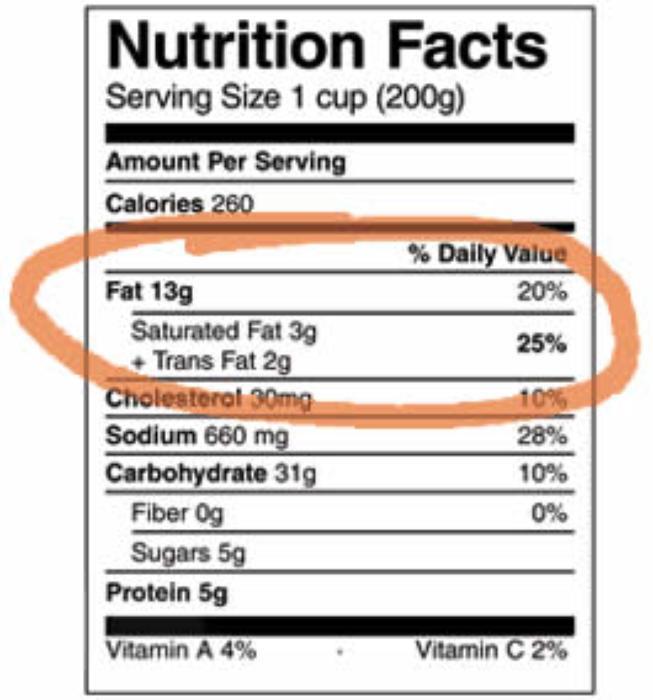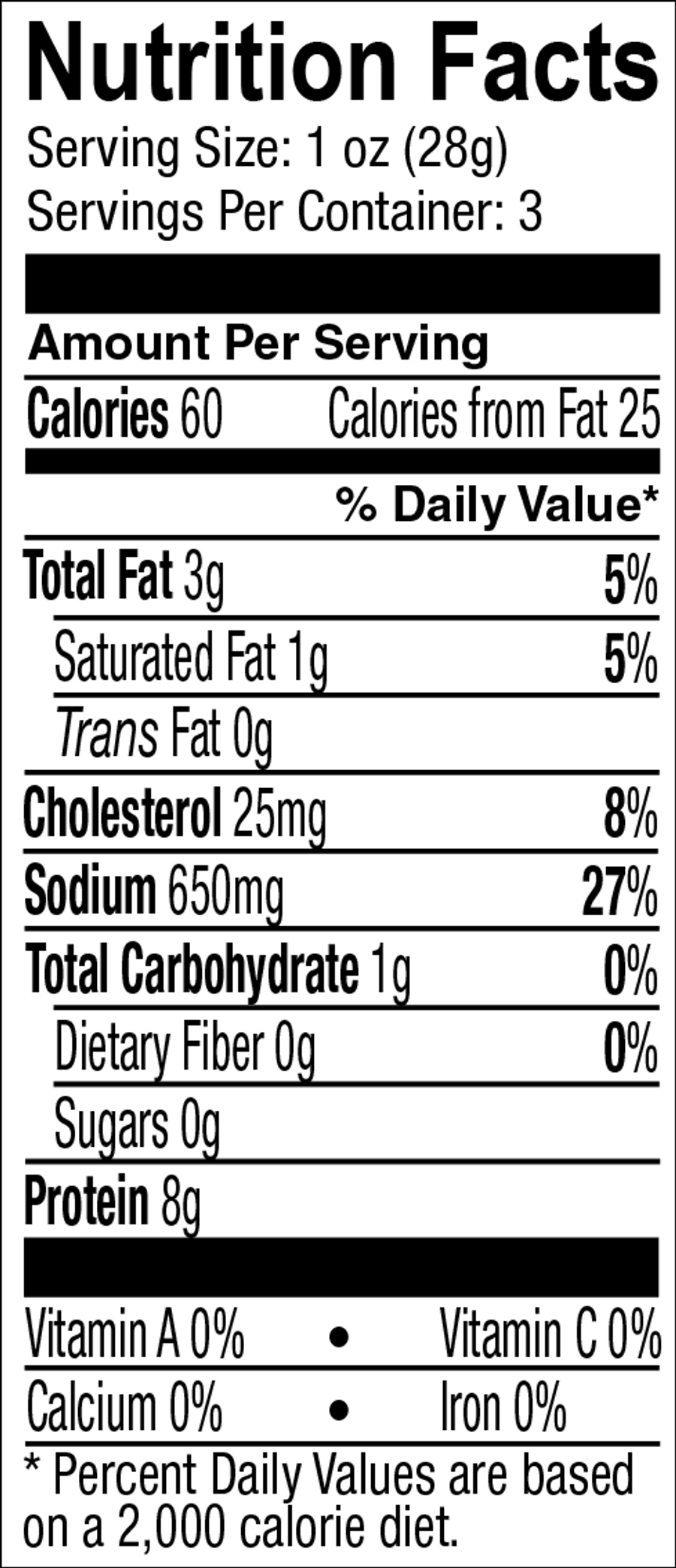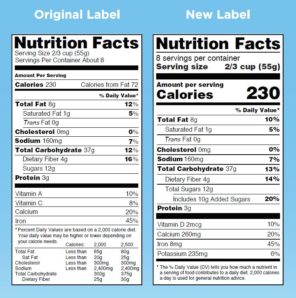45 what is a health claim on food labels
Health Claims on Food Labels: What is Healthwashing? | 8fit Health claims on food labels can be classified into three categories: functional, general health, and nutrient content guidance. Functional includes how the food works on the body, such as fiber for the promotion of bowel regularity. General health claims provide guidance, for instance, soluble fiber to help reduce heart disease risk. Nutrient Claims on Food Labels - Clemson University Health Claims. Health claims, which the FDA must authorize, describe a relationship between a nutrient or food and a disease or health-related condition. If a claim names a specific disease risk, there is substantial scientific evidence that the food product may help protect against the disease in the context of a healthy diet. A few examples are:
In Pictures: 29 Foods With "Health Claims" That ... - Modern Health Monk #6 Chocolate Milk - "Vitamins A&D 37% Less Fat Than Whole Milk!" Ingredients? Okay, so there's actually milk in this. Good sign. Ingredient #2 = sugar. Ingredient #3-6 = cocoa mix science experiment & preservatives. Ingredient # 4 = Artificial flavors. De-lish. #7 Arizona Iced Tea "NO Calories!" At first we're like, "oh, sweet, no calories!?"

What is a health claim on food labels
Health Claims on Food Labels - LabelCalc Health claims, according to the FDA, are statements about the relationship between a food product or ingredient and a reduced risk of disease or a health condition. Basically, the FDA distinguishes two kinds of health claims: "authorized" and "qualified." Authorized Health Claims: Claims that have significant scientific agreement (SSA ... Label Claims for Conventional Foods and Dietary Supplements 07.03.2022 · Among the claims that can be used on food and dietary supplement labels are three categories of claims that are defined by statute and/or FDA regulations: health claims, nutrient content claims ... Health claims | EFSA - European Food Safety Authority 15.11.2018 · A health claim is any statement used on labels, in marketing or in advertising that health benefits can result from consuming a given food or from one of its components such as vitamins and minerals, fibre, and ‘probiotic’ bacteria. There are different types of health claims. For instance, statements that a food can help reinforce the body ...
What is a health claim on food labels. Introduction to Food Product Claims — FDA Reader A health claim describes a relationship between a food and a reduced risk of a disease or a health-related condition. This can be made in words, images (i.e. a heart), or a reference to a 3rd party certification. Example of a Health Claim: "Diets low in sodium may reduce the risk of high blood pressure, a disease associated with many factors." Gluten-free diet - Better Health Channel Food labelling and gluten. All packaged foods have ingredient labels printed on the box, package or bottle. There are three methods of finding suitable foods by reading the labelling. These include looking for: foods carrying the Coeliac Australia Endorsement logo; foods labelled ‘gluten free' Food labelling and packaging: Nutrition, health claims and supplement ... Nutrition and health claims You have to follow certain rules if you want to make a nutrition claim (for example, low fat) or a health claim (for example, calcium helps maintain normal bones). You... Health Claims on Food Labels - Consumer Reports Specifically, grass-fed meat and dairy has a more healthful ratio of omega-6 polyunsaturated fatty acids to omega-3s. Too much omega-6 fat in your diet can cause inflammation, which may be a factor...
Food Label Claims: What You Can and Can't Trust - WebMD Health claims. For example, a label could say that getting enough calcium throughout your life, and having a balanced diet, may lower your chances of getting osteoporosis. Structure/function claims. Nutrient content claims - Canadian Food Inspection Agency Steps for making a nutrient content claim. Requirements for making a nutrient content claim. Exceptions; Making a nutrient content claim. Conditions for making a nutrient content claim; Information triggered by making a claim; Implied nutrient content claims; Quantitative declarations outside the nutrition facts table. Permitted nutrients Dietary Supplement Health and Education Act of 1994 To amend the Federal Food, Drug, and Cosmetic Act to establish standards with respect to dietary supplements, and for other purposes. Be it enacted by the Senate and House of Representatives of the United States of America in Congress assembled, §1. Short Title; Reference; Table Of Contents. (a) Short Title. Easy Guide to Understanding Food Labels When You Have High ... - MyDoc Food labels tell you what is in the food and drinks you are consuming. Every packaged and processed product should have a food label to help you determine its nutrition content. The food labels can help you sieve through misleading claims, shop faster and make better food choices to lower your cholesterol levels. Today, some restaurants even have nutrition information …
Health Claims on Labels: Can They Be Trusted? - Best Food Facts Health claims on food labels are regulated by the federal government. The claims must be verified by scientific data. The statements are optional, so food may have health benefits even if it doesn't carry a specific label. Label claims are a good starting point to learn about the nutrition of food. About The Experts Marie-Eve Labonte Nutrition Health and nutrition claims on food labels - FoodTruths Health claims on packaged foods are classified into general claims and high level health claims. A general claim will relate to the effect on health of a nutrient or ingredient in a product. An example of this type of claim would be saying that a product is a good source of protein which is 'necessary for tissue building and repair'. Label Claims for Food & Dietary Supplements | FDA Among the claims that can be used on food and dietary supplement labels are three categories of claims that are defined by statute and/or FDA regulations: health claims, nutrient content claims,... Health Claims on Food Labels | Cigna Health Claims on Food Labels Food makers can make health claims about certain nutrients, such as calcium, fiber, and fat, that are found naturally in foods. The health claims must be balanced and based on current, reliable scientific studies. And the claims must be approved by the U.S. Food and Drug Administration (FDA).
Health Claims on Food Labels - Kaiser Permanente Search the Healthwise Knowledgebase . Help: Healthwise Index: Topic Contents. Topic Overview; Related Information; Credits; This information does not replace the advice of a docto
Food label health claims: what you're getting wrong | Well+Good A t this point, most healthy eaters know that you have to give most food label health claims and slogans a hefty dose of side eye. (Here's looking at you, "whole wheat.") But even the most...
What health claims on food labels really mean? - FSSAI FAQ MENTOR FDA has strict guidelines on how certain food label terms can be used. It also set standards for health related claims on food labels to help consumers identify foods that are rich in nutrients and may help to reduce the risk of certain diseases. e.g. health claims may highlight the link between calcium and osteoporosis, dietary fibre and some cancers, saturated fat and heart disease or high ...
Food Packaging Claims | American Heart Association There are three categories of claims defined by statute and/or FDA regulations that can be used on food and dietary supplement labels: health claims, nutrient content claims, and; structure/function claims. A "health claim" by definition has two essential components: A substance (whether a food, food component, or dietary ingredient) and
Organic on Food Labels | FDA 07.03.2022 · For more information on the use of the term “organic” on food labels and USDA requirements, go to the National Organic Program website. Content current as of: 03/07/2022
Questions and Answers on Health Claims in Food Labeling Health claims in food labeling are claims that have been reviewed by FDA and are allowed on food products to show that a food or food component may reduce the risk of a disease or a health-related...
Nutrition content claims and health claims - Food Standards Nutrition content claims. Nutrition content claims are about the content of certain nutrients or substances in a food, such as 'low in fat ' or 'good source of calcium'. These claims need to meet certain criteria. For example, food with a 'good source of calcium' claim needs to contain at least the amount of calcium specified in the Standard.
Health Claims on Food Labels Health claims may be statements like: "This food is a good source of calcium. Adequate intake of calcium may reduce the risk of osteoporosis." "Development of cancer depends on many factors. A diet low in total fat may reduce the risk of some cancers." But just because a food label has a health claim does not mean that the food is healthy for ...
Health Claims - Canada.ca A health claim is any representation in labelling or advertising that states, suggests, or implies that a relationship exists between consumption of a food or an ingredient in the food and a person's health. What do we do?
Food Label Health Claims Primer | Cooking Light By Sidney Fry, MS, RD April 01, 2012. Credit: Illustration: Gail Anderson and Joe Newton. Specific health claims—such as "lowers cholesterol"—are usually carefully regulated, but health implications made on food labels are another matter, practiced in the red-hot area where clever language tickles the buying impulse. Claim: "Added Fiber".
5 Understanding Food Labels and Health Claims - Maricopa Health Claims & Foods To keep companies from making false claims, the FDA provides food manufacturers' regulations in putting labels on packages that promote health. There are three levels of health claims: A health claim is supported by scientific evidence. An example is "reduces heart disease."
Health Claims on Food Labels | HealthLink BC Food makers can make health claims about certain nutrients, such as calcium, fibre, and fat, that are found naturally in foods. The health claims must be balanced and based on current, reliable scientific studies and must be approved by the Canadian Food Inspection Agency. Health claims may be statements like "This food is a good source of calcium.
Top 5 health benefits of miso | BBC Good Food Top 5 health benefits of miso 1. May support gut health . The fermentation process involved in the production of miso promotes levels of beneficial bacteria, known as probiotics. These bacteria are thought to help a range of health issues, including digestion and gut health. By incorporating a variety of fermented foods in your diet, you may help promote levels of beneficial bacteria …
What You Need to Know About Health Claims on Food Labels and Dietary ... In general, health claims are statements made on food product labels or dietary supplements that boast some type of health benefit. This may seem simple, but the FDA doesn't treat every claim the same way. Label claims come in multiple forms: Health claims (which comprise of authorized health claims and qualified health claims)
Legal Guide to Health Claims on Food | Law@Dayton The Nutrition Labeling and Education Act, which amended the FD&C Act in 1990, requires most foods to be labeled with serving sizes and specific nutrition information, and it sets standards for food labels that make certain health claims. The Fair Packaging and Labeling Act of 1966 spells out packaging requirements for food and other packaged goods.












Post a Comment for "45 what is a health claim on food labels"